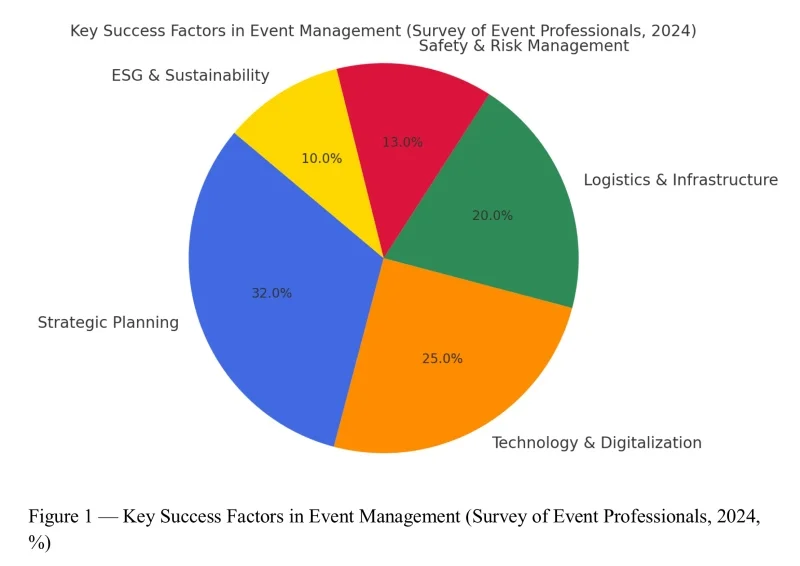The article is dedicated to analyzing strategies and tools that ensure the successful management of major events. It addresses issues of planning, logistics, team collaboration, technology integration, security, and sustainability. Using examples of international events, it demonstrates how thoughtful management not only reduces risks but also achieves significant economic, cultural, and reputational outcomes.
Importance of managing major events properly
Organizing large-scale events (sports tournaments, international exhibitions, festivals, forums) requires the integration of numerous processes: from strategic planning and budgeting to coordinating thousands of participants and working with the media. Management mistakes can lead to serious economic losses and reputational risks, whereas competent solutions strengthen the position of organizers and the host country.
Strategic Planning and Project-Based Approach
The first stage is creating a project roadmap. This includes:
- defining goals and KPIs (economic, reputational, social);
- developing budgets and financial models;
- forming a preparation and implementation timeline.
International practice shows that using project management methods (PMI, Agile, PRINCE2) helps adapt to changes and minimize unforeseen costs.
Logistics and Infrastructure
A key challenge for organizers is ensuring transportation accessibility, accommodation, venues, and technical equipment. For example, the Olympic Games or FIFA World Cups involve stadium construction, transport network development, and providing infrastructure for millions of visitors.
Working with Teams and Partners
Major events require the collaboration of numerous actors: government bodies, businesses, creative teams, technical contractors, and volunteers. Effective management is built on principles of distributed leadership, where each group is responsible for its area but integrated into the overall strategy.
Technology and Digitalization
Modern events cannot be imagined without digital tools:
- CRM and ticketing systems for managing sales;
- AR/VR and metaverses to expand the audience;
- Analytics systems for monitoring traffic and engagement;
- Automation of logistics and security.
According to PwC (2024), digitalization of event management allows reducing costs by 15–20% and increasing profitability by 10–12%.
Safety and Risk Management
Protection of participants’ health and lives, cybersecurity, and prevention of emergencies are mandatory components. Protocols such as HSE, evacuation plans, event insurance, as well as data monitoring for threats, are applied.
Sustainability and ESG
Modern events require the implementation of sustainability principles: eco-friendly materials, waste recycling, energy-efficient lighting, and social inclusion. According to Deloitte (2023), more than 60% of event participants in Europe and Asia consider environmental friendliness when choosing an event.
Technology and Digitalization
Modern events cannot be imagined without digital tools:
- CRM and ticketing systems for managing sales;
- AR/VR and metaverses to expand the audience;
- Analytics systems for monitoring traffic and engagement;
- Automation of logistics and security.
According to PwC (2024), digitalization of event management allows reducing costs by 15–20% and increasing profitability by 10–12%.
Safety and Risk Management
Protection of participants’ health and lives, cybersecurity, and prevention of emergencies are mandatory components. Protocols such as HSE, evacuation plans, event insurance, as well as data monitoring for threats, are applied.
Sustainability and ESG
Modern events require the implementation of sustainability principles: eco-friendly materials, waste recycling, energy-efficient lighting, and social inclusion. According to Deloitte (2023), more than 60% of event participants in Europe and Asia consider environmental friendliness when choosing an event.
Strategic Planning — 32%
Technology and Digitalization — 25%
Logistics and Infrastructure — 20%
Safety and Risk Management — 13%
ESG and Sustainability — 10%
(The chart shows the distribution of factors that experts identify as key for successful event management)
Conclusion
Managing major events goes beyond classical organization — it is a complex system requiring strategic vision, technological flexibility, and a sustainable approach. Successful projects build a positive image for countries and companies, attract investments, and create cultural heritage. In the future, key directions will include the integration of digital technologies, a focus on ESG, and the development of international cooperation, which will allow the events industry to reach a new level.
Author
Malika Kazakova is an expert in entertainment business and large-scale event production.
Sources
- PwC. Sports and Entertainment Outlook. 2024.
- Deloitte. Global Trends in Event Industry. 2023.
- OECD. Managing Mega Events: Lessons Learned. 2022.
- UNWTO. Tourism and Cultural Events Report. 2023.













